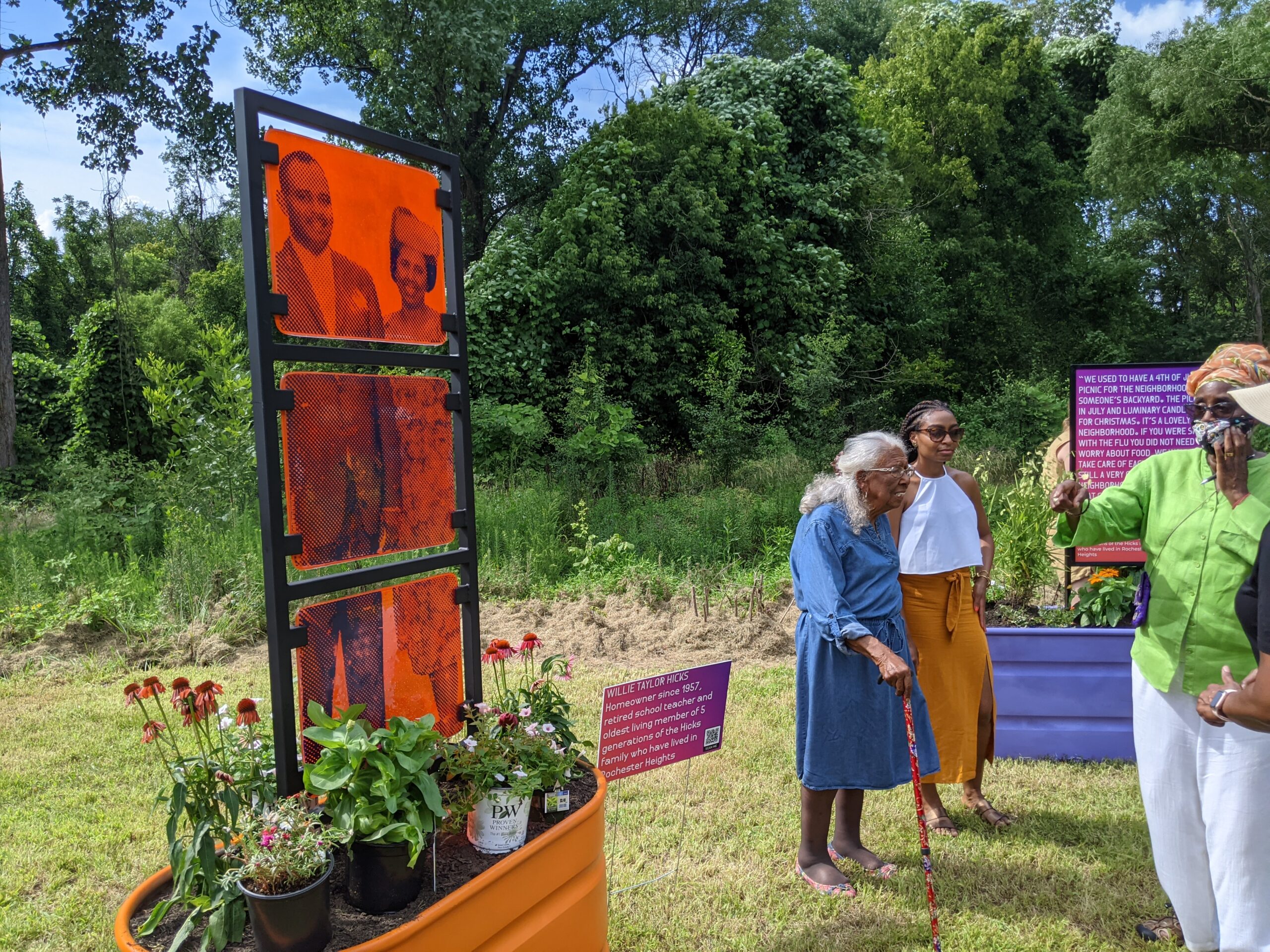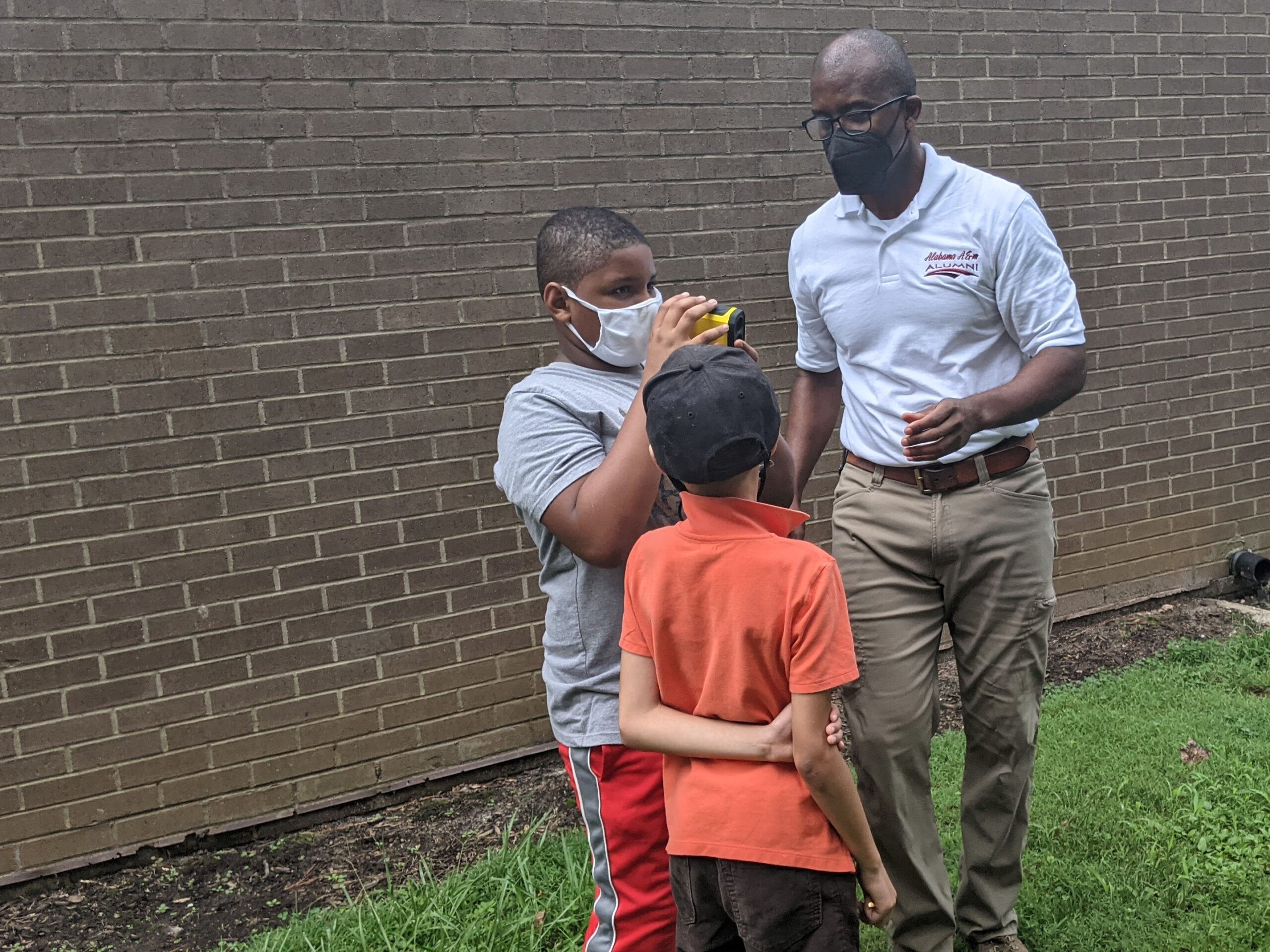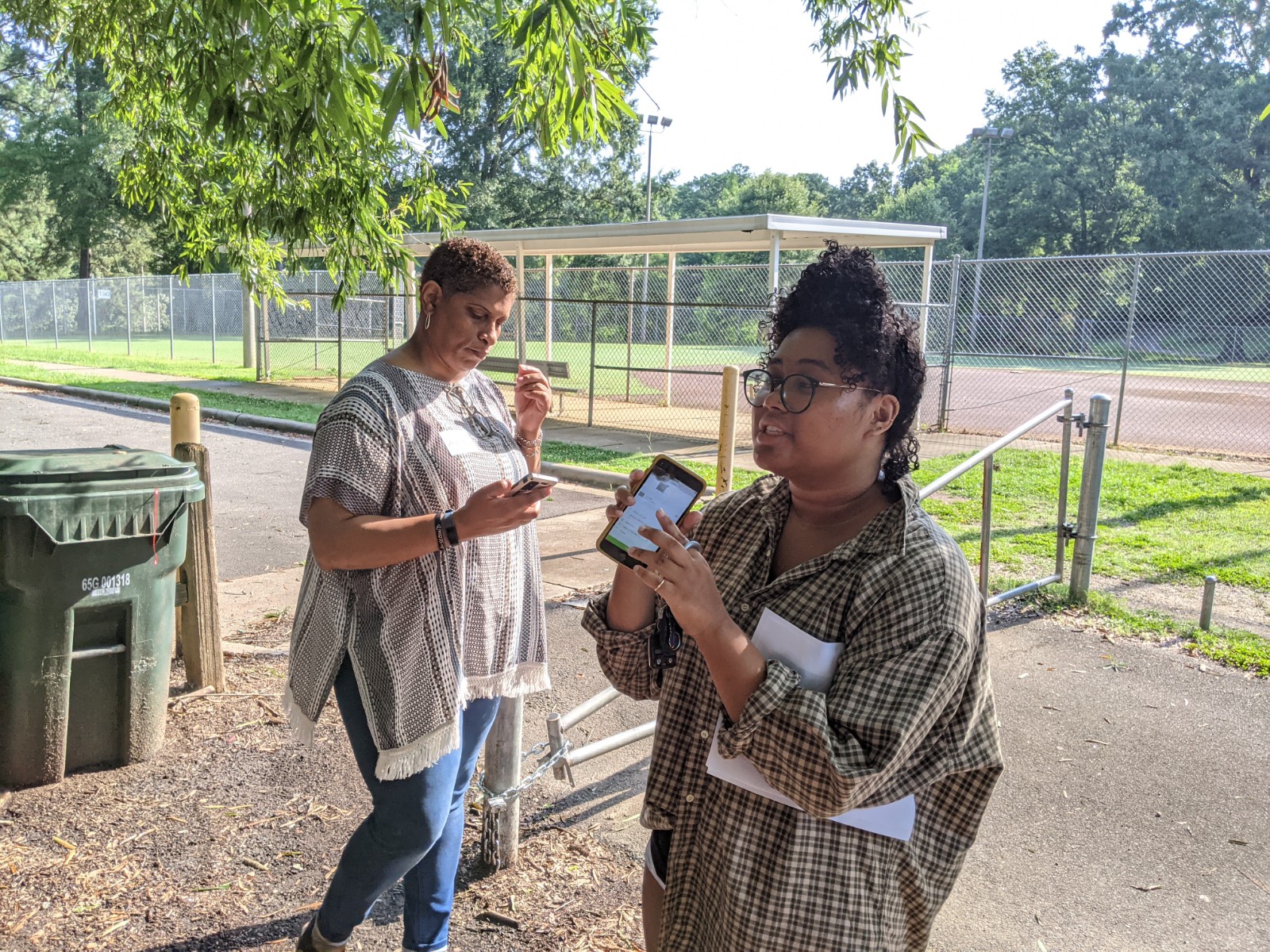
Above: “The Reflective History” art installation at the Bailey Drive Gateway site this summer — Willie Taylor Hicks (left), the woman depicted in the glass panel attends the art unveiling with the artist, Tiffany Baker (right).
BY CAMERON MILLER
The Walnut Creek Wetland Community Partnership was born out of the desire of community members and organizations to address environmental concerns for a critical stream in Southeast Raleigh.

Johnny Boggs, U.S. Forest Service, teaches young people how he measures trees height and age at a “Trees and You” workshop hosted at Biltmore Hills Park.
In particular, the partnership grew out of a 2014 summit hosted by NC State University inviting people to work with the nonprofit organization Partners for Environmental Justice (PEJ) and community members. Since then, WCWCP has taken a holistic approach to managing the Walnut Creek wetlands through interdisciplinary projects that bring together partners to tackle issues ranging from stormwater infrastructure to new parks.
“It’s about creation care.” the Reverend Robert Jemonde Taylor of St. Ambrose Episcopal Church often tells visitors of the community’s connections to the stream and wetland. “The environment is part of God’s creation and being good stewards is our duty.”
St. Ambrose is one of the WCWCP partners — and also served as the launching base for PEJ in 1995. That commitment over many decades continues. With help from WCWCP and financial cost share from the City of Raleigh, St. Ambrose has installed two 100-square foot rain gardens and 850-gallon rainwater cisterns on their grounds.
Louie Rivers, an NC State University faculty member whose work focuses on environmental justice, emphasizes the importance of long-term engagement for university partners. “The process of developing trust and working relationships with a community takes time, and WCWCP has provided a venue for this type of slow, but important engagement work.”
From large-scale projects like park development to smaller initiatives like tree walks, WCWCP seeks to engage communities at all levels, providing tools and knowledge to aid in their advocacy.
Working with the community members, WCWCP is coordinated by the NC Water Resources Research Institute (a longtime close collaborator and sister program of North Carolina Sea Grant), in partnership with NC State University College of Natural Resources. In spite of the pitfalls of COVID restrictions, the partnership has accomplished a great deal in 2021. Here are a few examples.
The aim is to create a southern gateway into the park that incorporates the cultural history of the surrounding Biltmore Hills and Rochester Heights neighborhoods. In July, a temporary art installation by Tiffany Baker was unveiled at the Bailey Drive Gateway site. This walkable installation utilized portraits of neighbors to highlight the significance of these communities.
Consultant Jackie Turner worked with the park designers from Design Workshop to coordinate the unveiling event and spur community engagement. The process and the piece has “celebrated the original residents and builders of the community,” Turner said, noting in particular the oral histories collected for the project.
“I provide opportunities for people to tell their stories — listening is very important.”
WCWCP also has worked with the Walnut Creek Watershed Learning Network (WCWLN). The initiative was launched in early 2021 by PEJ.
The six-week WCWLN training program designed to empower community members through education on topics including watershed management, environmental justice, and green infrastructure as they relate to the Walnut Creek Watershed. Participants range from high school students to retirees, all of which live in and around the watershed. The network’s second series will end Nov. 20, and has included field trips, such as to St. Ambrose.
PEJ’s longtime secretary and founding member Carolyn Winters states the multiple activities have a common thread: to let community members “know that we are here, identify with their concerns, including some issues that they may not be aware of, and working for them.”
The commitment to residents is keen. “We can’t solve all their problems, but we can let them know that they have an ally, ” she adds.
Christy Perrin, WRRI sustainable waters and communities coordinator for WRRI and also for NC Sea Grant, shares her excitement for the overall program, as well as the implications of its funding. PEJ is based in Raleigh, but received a grant from the Town of Cary that has helped to fund the WCWLN. “It’s a new thing for an upstream municipality to provide funds for activities in another jurisdiction downstream in Walnut Creek,” Perrin says.
Winters also notes that PEJ is sharing their successful engagement strategies and expertise with Cary officials and residents for projects there as well.
Perrin, who coordinates WCWCP along with Rivers, says that this particular project reflects how PEJ is building up capacity to make change — an overarching goal for the group. “It’s equipping participants of the watershed network who live or work in the watershed, teaching them how to be involved, how to either be hands on or advocate for policy changes in their watershed.”

Alyanna Wilson instructs participants in how to use the i-naturalist app at a “Trees and You” workshop at Biltmore Hills Park. Data collected by participants was used to create a tree guide for Biltmore Hills Park.
In 2021, the partnership made leaps forward in planning and installing Green Stormwater Infrastructure (GSI) in the communities surrounding the wetlands. GSI reduces impacts of stormwater runoff while providing natural habitat and public health benefits, Perrin explains.
WRRI and City of Raleigh began the Biltmore Hills Park GSI project funded by an EPA 319 grant that supports communities to address nonpoint source pollution in impaired watersheds, and had additional “cost share” from the city providing services.
Conversations with community members along the flood-prone Rochester Heights Creek in early 2020 led the team to plan and seek funds for a series of GSI projects, including large bioretention areas, also known as rain gardens, along with rain-harvesting cisterns at Biltmore Hills Park. Kris Bass Engineering is designing the GSI, with installation planned in 2022.
Town of Cary is also supporting partners’ collaborative efforts to install residential-sized rain gardens this fall at homes in Biltmore Hills Neighborhood — and further up Walnut Creek in Cary — along with a rainwater harvesting system at a new Interfaith Food Shuttle (IFFS) community garden on Cross Link Road. The City of Raleigh is finishing installation of its own GSI projects to reduce runoff from the street fronting the city’s Walnut Creek Wetland Park, with art to interpret the projects.
Alyanna Wilson worked with Perrin in summer 2021 through the National Sea Grant Community Engaged Intern program. Her community outreach focused on the Biltmore Hills Park Green Stormwater Infrastructure project. Having helped plan a number of community engagement events for the project, her outlook on its future is rather optimistic:
“I think our projects will lead to lasting benefits for the communities we’ve been able to work with,” she explains. “ I’m excited to see where the projects head moving forward.”
more about the North Carolina Water Resources Research Institute